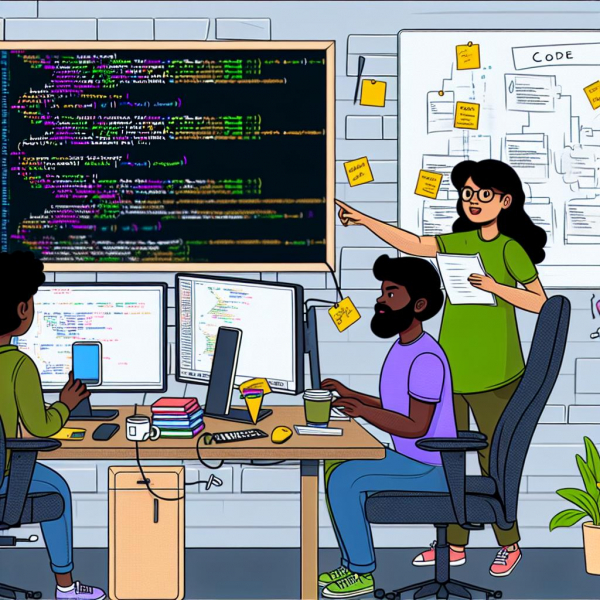In the digital realm, where websites and applications are the lifeblood of our interconnected world, there exists a group of unsung heroes. They are the architects of the online universe, the puppeteers behind the scenes, the wizards who breathe life into static pixels on your screen. They are JavaScript developers. But what exactly do these digital maestros do? What kind of magic do they weave to transform lines of cryptic code into dynamic, interactive web experiences? Let’s pull back the curtain and delve into the fascinating world of JavaScript developers.
Table of Contents
- Understanding the Role of a JavaScript Developer
- The Daily Tasks of a JavaScript Developer
- Exploring the Tools and Technologies Used by JavaScript Developers
- The Importance of Problem-Solving Skills in JavaScript Development
- How JavaScript Developers Collaborate with Other Team Members
- Career Pathways and Opportunities for JavaScript Developers
- Tips for Aspiring JavaScript Developers: How to Get Started
- Q&A
- Insights and Conclusions

Understanding the Role of a JavaScript Developer
JavaScript developers are the architects of the digital world. They are responsible for implementing and maintaining the interactive elements of a website or web application, which are often the features that make a site engaging and user-friendly. This can include anything from creating simple animations to building complex web applications.
One of the primary responsibilities of a JavaScript developer is to write and debug JavaScript code. This involves designing and implementing new features, as well as troubleshooting and fixing bugs in existing code. They also work closely with other members of a development team, such as front-end developers and UX designers, to ensure that the final product is both functional and visually appealing.
- Designing and implementing new features: This involves brainstorming ideas for new features, writing the code to implement them, and then testing the features to ensure they work correctly.
- Debugging: When a bug is reported, it’s the JavaScript developer’s job to find the source of the problem and fix it. This often involves reading through lines of code and using debugging tools.
- Collaboration: JavaScript developers don’t work in a vacuum. They often collaborate with other developers and designers to create a cohesive final product.
| Role | Responsibility |
|---|---|
| JavaScript Developer | Writing and debugging JavaScript code |
| JavaScript Developer | Designing and implementing new features |
| JavaScript Developer | Collaborating with other team members |

The Daily Tasks of a JavaScript Developer
JavaScript developers are the architects of the digital world, crafting intricate web applications and interactive elements that enhance user experience. Their daily tasks are diverse and challenging, requiring a blend of technical expertise, creativity, and problem-solving skills.
One of the primary responsibilities of a JavaScript developer is coding and programming. They spend a significant portion of their day writing and debugging JavaScript code, ensuring that web applications function smoothly. This involves creating functions, manipulating DOM elements, and implementing event handlers. They also use various JavaScript libraries and frameworks like React, Angular, and Vue.js to expedite the development process and enhance the functionality of web applications.
- Testing and debugging is another crucial task. JavaScript developers use testing frameworks like Jest or Mocha to identify and fix bugs in their code. They also perform cross-browser testing to ensure that the web applications function correctly across different browsers.
- They are also responsible for optimizing web applications for maximum speed and scalability. This involves minifying code, optimizing images, and implementing lazy loading techniques.
- Moreover, JavaScript developers often collaborate with other team members, including UX/UI designers and backend developers. Therefore, communication and collaboration are integral parts of their daily tasks.
| Task | Tools/Frameworks Used |
|---|---|
| Coding and Programming | React, Angular, Vue.js |
| Testing and Debugging | Jest, Mocha |
| Optimizing Web Applications | Lazy loading techniques, Image optimization tools |
| Communication and Collaboration | Slack, Trello, Jira |
In conclusion, are multifaceted and dynamic, requiring a blend of technical skills, creativity, and effective communication. Despite the challenges, it’s a rewarding career path for those passionate about web development and digital innovation.

Exploring the Tools and Technologies Used by JavaScript Developers
JavaScript developers are the architects of the digital world, crafting intricate web applications and interactive elements that enhance user experience. They utilize a variety of tools and technologies to bring their creations to life. One of the most popular tools is Node.js, a runtime environment that allows developers to execute JavaScript outside of a web browser. This opens up a world of possibilities, including building back-end services like APIs.
Another essential tool in the JavaScript developer’s arsenal is React.js, a JavaScript library for building user interfaces. React.js allows developers to create large web applications that can change data, without reloading the page. It’s fast, scalable, and simple, making it a favorite among developers. Other commonly used technologies include:
- Angular.js: A structural framework for dynamic web apps.
- Vue.js: A progressive framework for building user interfaces.
- Express.js: A minimal and flexible Node.js web application framework.
- MongoDB: A source-available cross-platform document-oriented database program.
JavaScript developers also rely heavily on Integrated Development Environments (IDEs) and code editors. Some of the most popular include Visual Studio Code, Sublime Text, and Atom. These tools offer features like syntax highlighting, intelligent code completion, and debugging support, making the development process more efficient.
| Tool | Use |
|---|---|
| Node.js | Execute JavaScript outside of a web browser |
| React.js | Build user interfaces |
| Angular.js | Build dynamic web apps |
| Vue.js | Build user interfaces |
| Express.js | Build web applications |
| MongoDB | Database management |
These tools and technologies are just the tip of the iceberg. The world of JavaScript development is vast and constantly evolving, with new tools and frameworks emerging all the time. By mastering these technologies, JavaScript developers can create powerful, interactive web applications that drive the digital world.

The Importance of Problem-Solving Skills in JavaScript Development
When it comes to JavaScript development, one of the most critical skills to master is problem-solving. This is because JavaScript, as a dynamic and high-level programming language, often presents complex challenges that require innovative solutions. Problem-solving skills are not just about fixing bugs or errors in the code, but also about optimizing the code to make it more efficient, scalable, and maintainable.
For instance, a JavaScript developer might need to figure out how to make a website more interactive, how to handle asynchronous operations, or how to manipulate the Document Object Model (DOM). These tasks require a deep understanding of JavaScript and its associated technologies, as well as a knack for solving problems. Here are some key areas where problem-solving skills come into play in JavaScript development:
- Debugging: This involves identifying and fixing errors or bugs in the code. It requires a systematic approach to isolate the problem and find the best solution.
- Performance optimization: This involves improving the speed and efficiency of the code. It requires a deep understanding of JavaScript and its performance characteristics.
- Code refactoring: This involves restructuring existing code without changing its external behavior. It requires a keen eye for code quality and design patterns.
Moreover, problem-solving skills are not just technical, but also interpersonal. A JavaScript developer often needs to collaborate with other team members, such as designers, testers, and project managers. This requires the ability to communicate effectively, understand different perspectives, and negotiate solutions that meet everyone’s needs.
| Problem-Solving Skill | Importance in JavaScript Development |
|---|---|
| Debugging | Identifying and fixing errors or bugs in the code |
| Performance optimization | Improving the speed and efficiency of the code |
| Code refactoring | Restructuring existing code without changing its external behavior |
How JavaScript Developers Collaborate with Other Team Members
JavaScript developers often work in teams, and their collaboration with other team members is crucial for the success of a project. They interact with a variety of professionals including UI/UX designers, back-end developers, project managers, and quality assurance testers. Their role is not just about writing code, but also about understanding the needs of these other team members and integrating their work into a cohesive whole.
For instance, when working with UI/UX designers, JavaScript developers help to bring their designs to life on the web. They need to understand the design principles and user experience considerations that the designers are working with. Similarly, when collaborating with back-end developers, they need to understand the data structures and APIs that the back-end team is providing. They also work closely with project managers to ensure that their work is aligned with the overall project timeline and goals. Lastly, they collaborate with quality assurance testers to identify and fix bugs in their code.
| Team Member | Collaboration |
|---|---|
| UI/UX Designers | Bring designs to life on the web |
| Back-end Developers | Understand and use data structures and APIs |
| Project Managers | Align work with project timeline and goals |
| Quality Assurance Testers | Identify and fix bugs in code |
Effective collaboration requires good communication skills, a willingness to understand and respect the roles of other team members, and a commitment to the overall success of the project. By working together, JavaScript developers and their colleagues can create web applications that are both functional and user-friendly.
Career Pathways and Opportunities for JavaScript Developers
JavaScript developers are in high demand in today’s digital world. They are responsible for implementing and managing web applications and software, ensuring that they run smoothly and efficiently. Their tasks include writing and testing code, debugging programs, and integrating applications with third-party web services. They also work closely with other team members to develop new features and improve functionality.
There are numerous career pathways and opportunities available for JavaScript developers. They can work as Front-end Developers, focusing on the client-side development, user interface, and user experience. They can also become Back-end Developers, dealing with server-side logic, databases, and application integration. Another option is to become a Full Stack Developer, who handles both front-end and back-end development. Additionally, they can specialize in certain areas such as data visualization, gaming, or mobile app development.
- Front-end Developer: Specializes in visual elements, user interfaces, and client-side logic.
- Back-end Developer: Works on server-side logic, database interactions, and application integration.
- Full Stack Developer: Handles both front-end and back-end, capable of working on all aspects of a project.
- Data Visualization Developer: Focuses on representing complex data in a visual, intuitive format.
- Game Developer: Specializes in creating interactive games for web and mobile platforms.
- Mobile App Developer: Develops applications specifically for mobile devices.
| Career Path | Key Responsibilities |
|---|---|
| Front-end Developer | Designing user interfaces, implementing visual elements, ensuring responsiveness of applications |
| Back-end Developer | Managing server-side logic, integrating databases, ensuring data consistency |
| Full Stack Developer | Handling all aspects of project, from front-end to back-end |
| Data Visualization Developer | Creating intuitive, visual representations of complex data |
| Game Developer | Designing and developing interactive games for web and mobile platforms |
| Mobile App Developer | Developing and optimizing applications for mobile devices |
Tips for Aspiring JavaScript Developers: How to Get Started
JavaScript developers are the architects of the digital world. They are responsible for implementing and maintaining the interactive elements of a website that users engage with. This includes everything from creating simple animations to complex web applications. They work closely with web designers to bring their designs to life and ensure that the website functions as intended. They also work with backend developers to connect the website with server-side infrastructure. In essence, JavaScript developers bridge the gap between the visual elements and the server-side infrastructure, taking an active role on both sides to ensure that the site functions smoothly and effectively.
As a JavaScript developer, you’ll need to master a variety of skills. Here are some key areas you should focus on:
- Understanding of core JavaScript: This includes concepts like variables, data types, functions, control structures, and error handling.
- Knowledge of JavaScript frameworks: Frameworks like Angular, React, and Vue.js can help you build complex applications more efficiently.
- Experience with HTML and CSS: While JavaScript is crucial, you’ll also need a solid understanding of HTML and CSS to create and style web pages.
- Problem-solving skills: Coding is all about solving problems. You’ll need to be able to think logically and come up with efficient solutions.
- Understanding of version control systems: Tools like Git help developers track changes to their code and collaborate with others.
Here’s a simple table to illustrate the importance of these skills:
| Skill | Importance |
|---|---|
| Core JavaScript | Essential |
| JavaScript Frameworks | Highly beneficial |
| HTML and CSS | Essential |
| Problem-solving | Essential |
| Version Control Systems | Beneficial |
Q&A
Q: What exactly does a JavaScript developer do?
A: A JavaScript developer is responsible for implementing the front-end logic that defines the behavior of the visual elements of a web application. They are also often involved in connecting this with the services that reside on the back-end.
Q: What skills are required to become a JavaScript developer?
A: A JavaScript developer should have a strong understanding of JavaScript, including its quirks and workarounds. They should also have a good understanding of web markup, including HTML5 and CSS3, and be proficient in asynchronous request handling, partial page updates, and AJAX.
Q: What is the role of JavaScript in web development?
A: JavaScript is primarily used to enhance web pages to provide for a more user-friendly experience. This includes creating interactive forms, refreshing part of a page without reloading, or even creating a game.
Q: Is JavaScript only used for web development?
A: No, JavaScript is not limited to web development. It can also be used for server-side scripting through Node.js, to develop desktop applications, and even for game development.
Q: What is the difference between a JavaScript developer and a full-stack developer?
A: A JavaScript developer focuses on using JavaScript to create interactive and functional elements for websites or applications. A full-stack developer, on the other hand, works with both the front-end and back-end of a website or application, which may involve using JavaScript, but also includes working with databases and servers.
Q: How does a JavaScript developer collaborate with other team members in a project?
A: JavaScript developers often work closely with UX/UI designers to implement designs and improve user experience. They also collaborate with back-end developers to connect the web application to server-side functions.
Q: What are some popular tools and frameworks that JavaScript developers use?
A: JavaScript developers often use tools and frameworks like AngularJS, ReactJS, Vue.js, Ember.js, and Node.js to speed up development and create more efficient code.
Q: Is JavaScript a good language for beginners to learn?
A: Yes, JavaScript is a great language for beginners. It’s one of the core technologies of the web, so learning it opens up a lot of opportunities. Plus, there are plenty of resources available to help you learn.
Q: How is the job market for JavaScript developers?
A: The job market for JavaScript developers is quite robust. As the internet continues to grow and businesses continue to prioritize their online presence, the demand for skilled JavaScript developers is expected to rise.
Insights and Conclusions
As we draw the curtain on this enlightening journey into the world of JavaScript developers, we leave with a newfound appreciation for the architects of our digital world. They are the silent puppeteers, pulling the strings behind the scenes, breathing life into the static web pages, and creating the interactive, dynamic digital experiences we enjoy daily. From the simplest of websites to the most complex web applications, JavaScript developers are the wizards who weave the magic of interactivity. So, the next time you marvel at a beautifully designed website or a seamless web application, remember the JavaScript developers, the unsung heroes of the digital realm.
